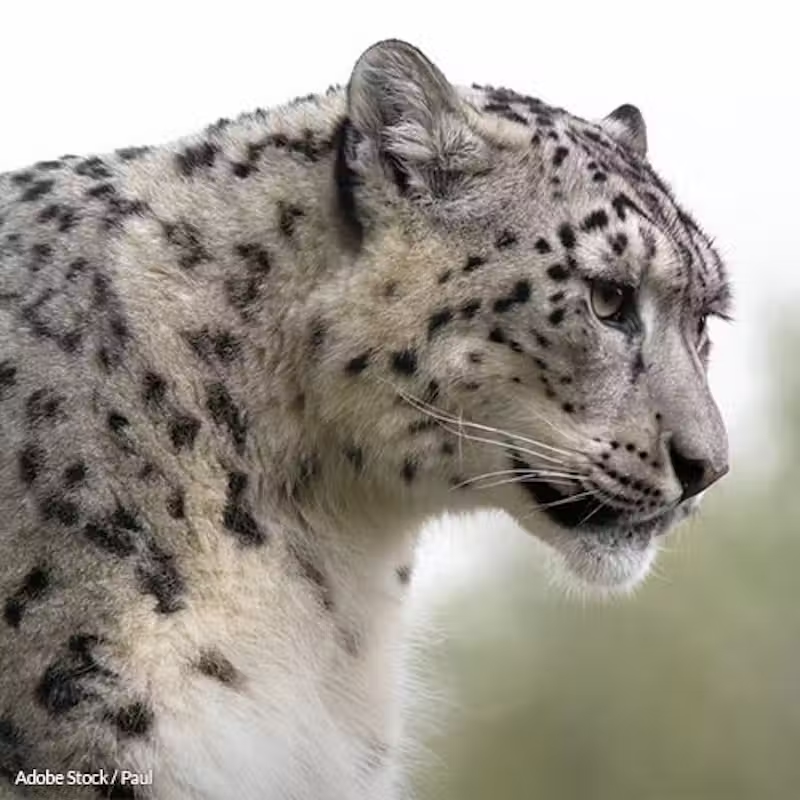Speak Up for Snow Leopards!
10,847 signatures toward our 30,000 Goal
Sponsor: The Rainforest Site
Save snow leopards from climate change by showing your support for the United Nations Framework Convention on Climate Change!

Sign now to show your support for protecting snow leopards from climate change through the international community's participation in the United Nations Framework Convention on Climate Change [UNFCCC].
Snow leopards are among an ever-growing list of species threatened by climate change. These magnificent cats live in 12 countries in Central Asia, ranging from the snow-covered mountains of Mongolia and Russia to the Himalayas of Nepal [1] where they play a critical role in their ecosystems as apex predators. Their short forelimbs, long hind limbs, and thick, meter-long tail helps snow leopards traverse steep mountains and thrive in their chilly, high-altitude habitat [2].
As the planet warms due to climate change, however, snow leopards are under increasing threat. Not only does climate change transform habitats, it also forces people to move into new space, including snow leopard habitat previously undisturbed by humans and their livestock [3]. When this occurs, there is often conflict between humans and the leopards when the leopards prey on the easy targets of domesticated animals. In response, herders kill the cats to protect their flocks.
According to National Geographic, "These cats appear to be in dramatic decline because of such killings, and due to poaching driven by illegal trades in pelts and in body parts used for traditional Chinese medicine. Vanishing habitat and the decline of the cats' large mammal prey are also contributing factors." [4]
Protecting snow leopard habitat is the best way to ensure their habitat is undisturbed by humans and remains ecologically sustainable. To do that, climate change must be slowed. According to Snow Leopards Face New Threat from Climate Change--People, "If climate change isn't slowed, more than a third of snow leopard territory might become unsuitable for the cats, according to the World Wildlife Fund (WWF), which has been helping to conserve them for many years." [5]
Fortunately, there is a multi-faceted approach being undertaken by the WWF to protect snow leopards which includes "ensuring access to a secure prey base; gaining a better understanding of snow leopard biology, particularly regarding genetics and disease; creating conditions for human populations in the snow leopard's range to better adapt to the impacts of climate change; and continuing to focus on reducing current threats, such as poaching, retaliatory killings and habitat degradation" [6].
But this is not enough. To have real, true, sustainable protections for the snow leopard, nothing short of an international effort to protect our planet's climate will suffice. Sign today to show your support for the international community's participation in the United Nations Framework Convention on Climate Change [UNFCCC] on behalf of the 4,500 - 7,500 snow leopards left in the wild [1].
MORE ABOUT THIS ISSUE
[1] RANGE MAP. (n.d.). Retrieved December 12, 2017, from http://snowleopardconservancy.org/range-map/
[2] Snow Leopards. (n.d.). Retrieved December 12, 2017, from https://amazingadaptations.weebly.com/snow-leopards.html
[3] Animals Affected by Climate Change. (n.d.). Retrieved December 12, 2017, from https://www.worldwildlife.org/magazine/issues/fall-2015/articles/animals-affected-by-climate-change#snow-leopard-habitat/
[4] Photograph by Joel Sartore, National Geographic Photo Ark. (2010, September 10). Snow Leopard. Retrieved December 12, 2017, from https://www.nationalgeographic.com/animals/mammals/s/snow-leopard/
[5] Snow Leopards Face New Threat from Climate Change-People. (2015, December 02). Retrieved December 12, 2017, from https://news.nationalgeographic.com/2015/12/151202-mongolia-climate-change-snow-leopards-livestock-world-wildlife-fund/
[6] Snow Leopards and Climate. (n.d.). Retrieved December 12, 2017, from https://www.worldwildlife.org/pages/snow-leopards-and-climate
The Petition:
To the United Nations Framework Convention on Climate Change [UNFCCC]:
I am writing to thank you for the important work you are doing to save our planet from the devastating effects of climate change.
As Earth warms, habitats and ecosystems are being threatened and transformed, threatening native flora and fauna. One such animal under increasing threat is the snow leopard, which is uniquely adapted for life in the snow-covered mountains of Central Asia. Around 4,500 to 7,500 of these magnificent cats remain in the wild, though their population continues to be threatened as their habitat vanishes.
Protecting snow leopard habitat is the best way to ensure their habitat is undisturbed by humans and remains ecologically sustainable. To do that, climate change must be slowed. According to Snow Leopards Face New Threat from Climate Change, "If climate change isn't slowed, more than a third of snow leopard territory might become unsuitable for the cats, according to the World Wildlife Fund (WWF), which has been helping to conserve them for many years."
By working to protect our climate, you are making significant contributions to the long-term sustainability of snow leopard populations. On behalf of snow leopards everywhere: thank you for all your hard work.
Sincerely,